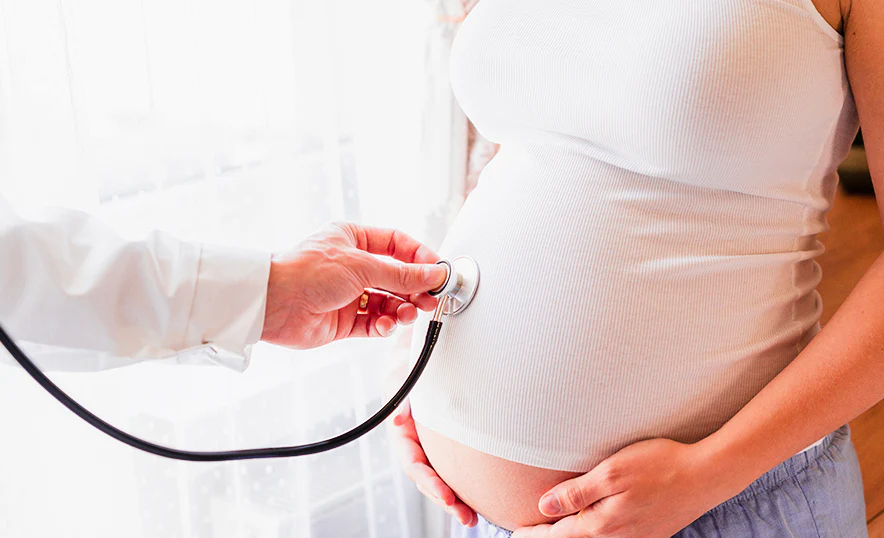The Role of Regular Check-ups in Ensuring a Healthy Pregnancy

Pregnancy is one of the most transformative experiences in a woman’s life. From physical changes to emotional shifts, the body undergoes a series of developments to nurture the growing life within. To ensure a healthy pregnancy and the well-being of both mother and child, regular prenatal check-ups are essential. These check-ups provide vital opportunities for monitoring the pregnancy’s progress, managing risks, and addressing any complications early on.
In this article, we will explore the role of regular check-ups in ensuring a healthy pregnancy, focusing on their importance, frequency, and the medical evaluations involved.
Importance of Regular Prenatal Check-ups
Prenatal care refers to the medical care provided to a pregnant woman by healthcare professionals throughout her pregnancy. Regular prenatal check-ups are crucial for several reasons:
- Monitoring the Health of the Mother and Baby:
Regular prenatal visits allow doctors or midwives to monitor the health of both the mother and the developing fetus. This involves checking for signs of complications, ensuring the baby is growing at a healthy rate, and evaluating the mother’s overall health. Early detection of potential issues can lead to timely interventions, significantly improving outcomes for both mother and baby. - Preventing Complications:
Certain pregnancy complications can arise unexpectedly, such as gestational diabetes, preeclampsia, and infections. Regular check-ups can help detect these conditions early, allowing healthcare providers to implement preventative measures or treatments to minimize risks. For instance, gestational diabetes can be managed through dietary changes and, in some cases, medication, which reduces the risk of complications like preterm birth or excessive fetal growth. - Nutritional and Lifestyle Guidance:
During prenatal visits, healthcare providers offer advice on maintaining a healthy lifestyle, which includes proper nutrition, exercise, and avoiding harmful substances such as alcohol and tobacco. Nutritional guidance is particularly important since a well-balanced diet plays a crucial role in supporting the baby’s development. Providers may also prescribe prenatal vitamins, especially folic acid, which helps prevent neural tube defects. - Emotional Support:
Pregnancy can bring a range of emotions, from joy and excitement to anxiety and stress. Regular check-ups provide an opportunity for expectant mothers to voice concerns and seek reassurance. Mental health is just as important as physical health during pregnancy, and addressing emotional well-being can lead to better outcomes for both the mother and baby.
Frequency of Prenatal Check-ups
The frequency of prenatal visits typically follows a standard schedule, but this may vary depending on the mother’s health, the progress of the pregnancy, and any pre-existing conditions. A typical schedule may look like this:
- Weeks 4–28: Once a month
During the first and second trimesters, prenatal visits are generally scheduled once a month. These early visits focus on confirming the pregnancy, estimating the due date, and screening for any risk factors that may affect the pregnancy. - Weeks 28–36: Every two weeks
As the pregnancy progresses into the third trimester, the frequency of visits increases to every two weeks. These visits monitor the baby’s growth, check for complications, and prepare the mother for delivery. - Weeks 36–Birth: Once a week
In the final weeks of pregnancy, weekly check-ups are common. At this stage, healthcare providers closely monitor the baby’s position, assess the readiness of the mother’s body for labor, and provide guidance on the delivery process.
High-risk pregnancies, such as those involving multiple babies or pre-existing medical conditions, may require more frequent visits and specialized care.
Medical Evaluations and Tests During Check-ups
During prenatal visits, a variety of medical evaluations and tests are conducted to monitor the health of both mother and baby. These assessments change as the pregnancy progresses and may include:
- Physical Examinations:
Each visit typically includes a general physical examination, where the healthcare provider checks the mother’s weight, blood pressure, and overall health. Weight gain is monitored to ensure it is within a healthy range, and blood pressure is checked for signs of conditions like preeclampsia. - Ultrasound Scans:
Ultrasound scans are a key part of prenatal care, allowing healthcare providers to visually monitor the baby’s development. The first ultrasound is often performed around 8–14 weeks to confirm the pregnancy, determine the due date, and check for multiple pregnancies. A more detailed anatomy scan is usually done between 18–22 weeks to assess the baby’s growth, check for birth defects, and evaluate the placenta and amniotic fluid levels. - Blood Tests:
Blood tests are performed throughout pregnancy to screen for various conditions. In the first trimester, blood tests check for anemia, blood type, and infections such as HIV, syphilis, and hepatitis. Later in pregnancy, additional tests may screen for gestational diabetes and Rh incompatibility (when the mother’s blood type is Rh-negative and the baby’s is Rh-positive). - Urine Tests:
Urine tests are regularly conducted during prenatal visits to check for protein and sugar levels, which can indicate conditions like gestational diabetes or preeclampsia. High protein levels in the urine, for example, may signal kidney issues or preeclampsia, which requires prompt medical attention. - Fetal Heart Monitoring:
Starting in the second trimester, healthcare providers use a Doppler device to listen to the baby’s heartbeat during each check-up. This simple but important test helps ensure that the baby is thriving. Later in pregnancy, non-stress tests may also be conducted to monitor the baby’s heart rate in response to movement, which can indicate fetal well-being. - Screening for Birth Defects and Genetic Disorders:
Prenatal visits offer opportunities for screening tests that assess the risk of birth defects and genetic conditions. These may include blood tests and specialized ultrasound scans (nuchal translucency scan) in the first trimester. Women with higher-risk pregnancies or those over the age of 35 may also be offered diagnostic tests like amniocentesis or chorionic villus sampling (CVS) to directly assess the baby’s genetic makeup. - Gestational Diabetes Screening:
Between 24 and 28 weeks, most pregnant women undergo a glucose screening test to check for gestational diabetes. This condition can lead to complications like high birth weight, preterm birth, and preeclampsia if not properly managed. If gestational diabetes is diagnosed, healthcare providers will work with the mother to manage her blood sugar levels through diet, exercise, and sometimes medication. - Group B Streptococcus (GBS) Test:
Late in pregnancy, usually between weeks 35 and 37, a swab test is performed to check for Group B Streptococcus, a type of bacteria that can be passed to the baby during childbirth. If the mother tests positive, she will receive antibiotics during labor to prevent the baby from becoming infected.
Tailored Care for High-Risk Pregnancies
For women with high-risk pregnancies, prenatal care often involves more frequent check-ups and specialized monitoring. High-risk factors may include advanced maternal age (35 or older), pre-existing medical conditions like hypertension or diabetes, a history of pregnancy complications, or carrying multiples. In these cases, healthcare providers may recommend additional tests and interventions to manage risks.
High-risk pregnancies may also require consultations with specialists, such as maternal-fetal medicine doctors, who focus on complicated pregnancies. These specialists can provide advanced care, including more detailed ultrasound evaluations and genetic counseling.
The Role of the Partner and Family Support
While the pregnant woman’s health is the primary focus, involving the partner and family in prenatal care can enhance the pregnancy experience. Attending prenatal visits together helps the partner stay informed, provides emotional support, and fosters a deeper connection with the pregnancy. Family support can also help reduce stress and improve mental well-being, which positively impacts the pregnancy.
Conclusion
Regular prenatal check-ups are essential for ensuring a healthy pregnancy, offering a comprehensive approach to monitoring the health of both mother and baby. From physical assessments and medical tests to emotional support and lifestyle guidance, these visits provide valuable opportunities for healthcare providers to detect and manage potential risks early on.
By following a recommended schedule of prenatal care, expectant mothers can improve their chances of having a healthy pregnancy, minimize complications, and prepare for a safe and successful delivery. Ensuring that both mother and baby receive the appropriate care throughout pregnancy is key to a positive pregnancy experience and a healthy start to life for the baby.

